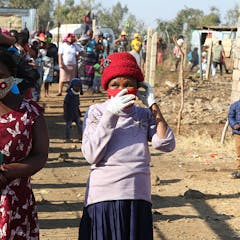
Articles on Social science
Displaying 1 - 20 of 27 articles

Women are often victims of these highly patriarchal crime systems – but they can also be powerful decision makers and exploiters of others.

With an evidence-based strategy and careful evaluation, gender parity in science is achievable.

How much does human behavior influence climate change? Can it be changed, and how? In June, climate change experts and behavioral scientists came together to answer these important questions.

Large language models are becoming increasingly capable of imitating human-like responses, creating opportunities to test social science theories on a larger scale and with much greater speed.

A sobering picture emerges from a study testing social scientists’ ability to predict societal change during the COVID-19 pandemic.

Trauma can affect how people remember and describe experiences. Many survivors express their pain through objects and physical symptoms, an anthropologist explains.

Canada’s innovation problem stems from an outdated research and development model. It is time to redesign the research department to include more social scientists and fewer technocrats.

Psychological and social perspectives on economy that were developed by 19th-century philosophers can help us re-imagine economics with a human face.

King Charles has inherited the crown at a time when support for the institution of the monarchy has fallen to a new low.

A 1972 report warned that unchecked consumption could crater the world economy by 2100. Fifty years and much debate later, can humanity innovate quickly enough to avoid that fate?

Studies on Ukraine going as far back as the late 1990s and early 2000s showed that the country’s population was connecting less and less with Russia.

The answers to Nigeria’s poor social science research output seem to lie in quantity and quality of personnel, time available for research, funding, support institutions and policy.

How two Canadian teams of economists and epidemiologists studied COVID-19 from a social science perspective to show that higher national income inequality is associated with worse COVID outcomes.

Research from Meta and some scientists shows no harm from social media, but other research and whistleblower testimony show otherwise. Seemingly contradictory, both can be right.

Tropes around woke warriors and their heartless parents get us nowhere.

It is the work of social scientists to understand how societies operate and, based on that knowledge, how populations can apply evidence-based solutions to the challenges of the 21st century.

An AI analysis shows that differences in how New Yorkers and Angelenos tweet go beyond the words they use.

Across 29 countries, there are wide disparities between how women feel about going out alone and how men feel.

The lead role of public health researchers continues to be important. But there is growing acknowledgement that social scientists have to be present from the very beginning.

Scholars who study dangerous speech have identified common themes that can lead to violence.
